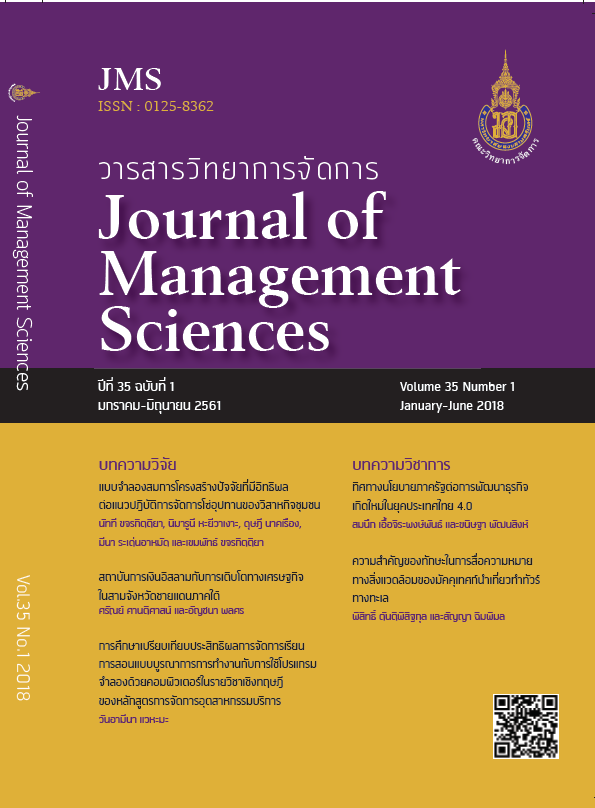Islamic Financial Institutions and Economic Growth in the Three Southern Border Provinces
Main Article Content
Abstract
This research aims to study the relationship between the Islamic financial institutions’ amount of financing in the three southern border provinces (the Islamic Bank of Thailand, the Islamic Bank Fund of the Bank for Agriculture and Agricultural Cooperatives, and the Ibnu Affan Islamic Cooperative), economic growth, and its impact on poverty during 2006 to 2014. By analyzing secondary data via econometric techniques including the Granger Causality Test and the Panel Least Squares, and an in-depth interview of the institution’s management, results show that economic growth in the three southern border provinces causes the amount of Islamic financing to grow. We, however, do not find a reverse relationship. Despite this result, we do find that Islamic financing has a significant impact in decreasing poverty in the area.
Article Details

This work is licensed under a Creative Commons Attribution-NonCommercial-NoDerivatives 4.0 International License.
All published articles are SJMS’s copyright. The editorial board allows all published articles to be copied, excerpted, or disseminated with academic citation.
References
Abduh, M. & Omar. M.A. (2012). Islamic banking and economic growth: the Indonesian experience. International Journal of Islamic and Middle Eastern Finance and Management, 5(1), 35-47.
Agrawal, P. (2007). Economic Growth and Poverty Reduction: Evidence from Kazakhstan. Asian Development Review, 20(2), 90-115.
Deolalikar, A. (2002). Poverty Growth and Inequality in Thailand. ERD Working Paper Series No.8, Economics and Research Department, Manila, Asian Development Bank.
Furqani, H. & Mulyany, R. (2009). Islamic banking and economic growth: Empirical evidence from Malaysia. Journal of Economic Cooperation and Development, 30(2), 59-74.
Krongkaew, M., Chamnivickorn, S., & Nitithanprapas, I. (2006). Economic growth, employment, and poverty reduction linkages: The case of Thailand. Issues in Employment and Poverty Discussion paper 20.
Kpodar, K. & Imam, P. (2010). Islamic banking: How has it diffused? IMF Working Papers, WP/10/195.
Kumru, C. & Sarntisart, S. (2016). Banking for those unwilling to bank. Economic Modeling, 54, 1-12.
Ncube, M., Anyanwu, J., & Hausken, K. (2013). Inequality, Economic Growth, and Poverty in the Middle East and North Africa (MENA). Working Paper Series. African Development Bank Group.
Noipom, T. (2014). Can Islamic Micro-financing Improve the Lives of the Clients: Evidence from a Non-Muslim Country. Kyoto Bulletin of Islamic Area Studies, 7, 67-97.
Rattanathammaporn, M. (2002). The Effects of Unemployment and Inflation on Income Inequality and Poverty (Master’s Thesis). Chulalongkorn University, Bangkok.
Sarntisart, I. (2005). Socio-economic Silence in the Three Southern Border Provinces of Thailand. Journal of Public and Private Management, 12(2), 687-716.
Warr, P. (2002). Economic Recovery and Poverty Reduction. Thailand Development Research Institute Quarterly Review, 17, 18-27.
Warr, P. (2001). Poverty Reduction and Sectoral Growth: Evidence from Southeast Asia. Australian National University, Canberra.
Warr, P. & Wang, W. (1999). Poverty, Inequality and Economic Growth in Taiwan. The Political Economy of Development in Taiwan: Essays in Memory of John C. H. Fei, London, Edward Elgar, 133-165.
Well-Being Promotion for Muslim Thai Foundation. (2010). The 2010 Muslim Thai Census Report. Well-Being Promotion for Muslim Thai Foundation, Bangkok.

